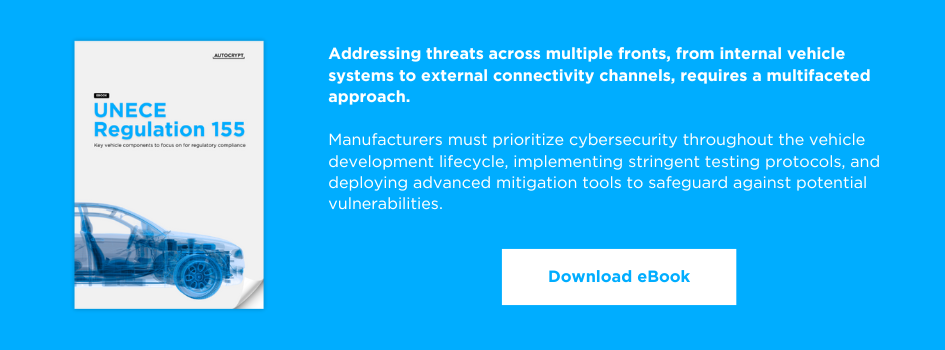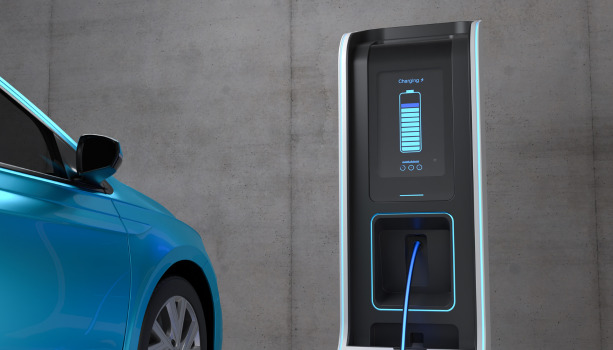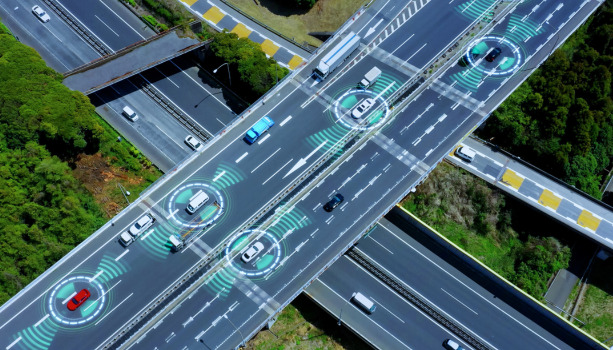The automotive industry is entering an important stage of cybersecurity implementation. In July of 2024, UNECE Regulation 155 (UN R155) about vehicle cybersecurity and Cybersecurity Management Systems (CSMS) is coming into full force. What does this mean for the larger automotive industry?
Vehicle manufacturers across the 64 WP.29 member countries will be required to adhere to regulatory compliance measures outlined in UNECE Regulation 155. Vehicles that do not comply with the regulations will not be eligible for registration starting July 2024. We can already see how the regulation is affecting the industry in the recent Porsche announcement. The company stated that they will be discontinuing the combustion-powered 718 Boxster convertible and the 718 Cayman models in certain countries, due to not meeting the cybersecurity standards outlined in UN R155 legislation.
UN R155 is a set of regulations developed by the United Nations Economic Commission for Europe (UNECE) pertaining to cybersecurity in vehicles. The regulation establishes cybersecurity requirements for the vehicle manufacturing process and vehicle type approval, aimed at enhancing the security of connected vehicles and increasing resilience against cyber threats.
Essential Approval Requirements
The essential UN R155 approval requirements for automotive cybersecurity, address standards and protocols for securing connected vehicles against cyber threats. However, UN R155 does not only focus on vehicle cybersecurity. The regulation oversees the entire vehicle manufacturing process, enforcing cybersecurity measures to be incorporated on an organizational level and throughout the vehicle’s entire lifecycle.
OEMs wishing to receive UN R155 approval must implement a cybersecurity management system that verifies secure operations throughout the vehicle development, production, and post-production phases.
Upon CSMS implementation OEMs must go through a CSMS assessment process, also known as a CSMS audit, that will be conducted by an appointed Approval Authority. During a CSMS audit, the Approval Authority assesses and verifies the manufacturer’s compliance with the requirements outlined in UN R155. If the assessment deems cybersecurity management system implementation successful, the OEM obtains the Certificate of Compliance for CSMS. The Certificate of Compliance is valid for three years and can be extended upon expiration.
Requirements for CSMS
The requirements for the Cybersecurity Management System are holistic in nature and call for vehicle manufacturers to follow cybersecurity-by-design principles. From a grander organizational perspective to granular vehicle attack vector assessments, the CSMS requirements seek appropriate cybersecurity measures that continuously monitor, detect, and respond to cyber threats across the vehicle development lifecycle According to UN R155, vehicle manufacturers should ensure that their Cybersecurity Management System complies with the following stipulations:
1. The vehicle manufacturer shall demonstrate that their CSMS applies to the vehicle development, production, and post-production stages.
2. The vehicle manufacturer shall demonstrate that the processes used within their CSMS to ensure security is adequately considered and implemented continuously. This requirement entails cybersecurity management processes, risk identification, assessment, and mitigation.
3. OEMs are expected to stay on top of new cyber threats and vulnerabilities, keeping their security measures current.
4. Vehicle manufacturers must be able to provide relevant data to support analysis of attempted or successful cyberattacks to their designated Approval Authority.
5. OEMs shall demonstrate that the processes used within their CSMS will ensure that cyber threats and vulnerabilities are addressed and mitigated within a reasonable time frame.
6. Vehicle manufacturers must be able to demonstrate how their CSMS will manage dependencies that may exist with suppliers, service providers, or manufacturer’s sub-organizations. This means that OEMs are accountable for implementing and verifying cybersecurity practices along their supply chains.
Requirements beyond the CSMS
Meeting cybersecurity management system requirements and obtaining the CSMS Certificate of Compliance is the first step of the regulatory compliance process. UN Regulation 155 also includes an array of cybersecurity requirements for vehicle type approval. The type approval process focuses on the effectiveness of the security measures implemented in the actual vehicle and its components.
Our latest ebook delves into the key vehicle components to focus on for UN R155 type approval and can offer insight into how different vehicle components require different types of cybersecurity measures.
Automotive cybersecurity implementation cannot be done in a one-size-fits-all manner. Different OEMs will have different cybersecurity and testing needs based on their organizational structures, vehicle manufacturing processes, and supply chains. With industry-leading expertise accumulated through years of experience in cybersecurity implementation, AUTOCRYPT offers professional consulting services for automotive OEMs and suppliers in establishing the CSMS.
To learn more about our CSMS Consulting Services and cybersecurity regulation compliance, contact global@autocrypt.io.




